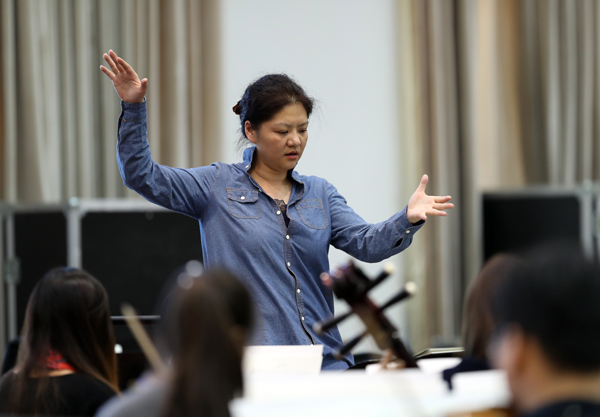Classical push
Faculty members of China's Central Conservatory of Music to debut works at the Lincoln Center in New York. Chen Nan reports.
A group of Chinese composers, all faculty members of the Central Conservatory of Music, will give a concert at Alice Tully Hall of the Lincoln Center for the Performing Arts in New York on Jan 27, in a growing trend of contemporary classical musicians from China playing in the West.
The Beijing conservatory, the country's top music school founded in 1950, has produced a long list of prominent musicians, some of whom will present their works at the show.
 |
|
Chen Bing will lead the concert of the Central Conservatory of Music Ensemble in New York. [Photo by Feng Yongbin/China Daily] |
Titled Music Contemporary From China 2018, the concert will feature the world premieres of seven musical pieces such as Ripples in Space Time by Jia Guoping, featuring sheng (a Chinese mouth-blown free reed instrument), pipa (a four-stringed Chinese instrument) and guzheng (Chinese zither), the ensemble Poetry on the Land by Qin Wenchen, featuring sheng, zheng and an ensemble, and Lagerstroemia Indica by Ye Xiaogang for pipa and ensemble.
Under the baton of Chen Bing, a young faculty member from the conservatory's conducting department, the Central Conservatory of Music Ensemble will perform along with soloists of traditional Chinese instruments, including erhu (a two-stringed bowed instrument) player Yu Hongmei, pipa player Zhang Qiang and guzheng player Ji Wei.
"We were very excited when the date of the show was set. This is the first time we will present top Chinese composers' new works at the famous venue. For the American audience, they will get a taste of Chinese music," says conductor Chen after a rehearsal in Beijing.
Chen, who began to learn the piano in childhood, obtained her master's degree from the conservatory in 2003.
The show for premiering new works by Chinese composers will become an annual event to be held in Beijing, New York and Austria, which "is just like unveiling the latest looks during the fashion week", Chen says.
Recitative for Chinese Gong by composer Guo Wenjing is among the works to be staged in New York this month. Guo wrote the piece in November, and it will have a percussionist playing the traditional instrument gong - eight gongs, each with its own sound range - along with other Chinese and Western instruments.
"This piece is a sacred rite. Along with special effects in the ensemble, the exquisite monologue on a single gong can lead one back to the ancient times," says Guo, 61, a professor of composition at the Beijing conservatory.
"I've been trying to discover more sounds produced by traditional Chinese instruments for decades because I believe that the potential of such instruments has been underestimated."
Guo, who was born in Southwest China's Chongqing city, started to learn the violin at age 12. By 16, his talent fetched him a position at the Chongqing Song and Dance Company. But he set his heart on composing in the mid-1970s after he came across records of Rimsky-Korsakov's Scheherazade, Alexander Borodin's In the Steppes of Central Asia and Dmitry Shostakovich's Symphony No 11. Hearing the Russian composers made him want to compose rather than be a violinist.
He was admitted to the conservatory in 1978, and along with classmates, including Tan Dun and Chen Qigang, became the first generation of Chinese composers to perform in the West.
In 1995, Guo wrote the piece, Drama, for Percussion Group Cincinnati, by using cymbals. In 2003, he composed a piece for a percussion group from The Hague that was played with a set of gong.
Unlike Guo's piece, which focuses on the gong, composer Tang Jianping's piece, Jin Lin, will see a mix of Western chamber ensemble with traditional Chinese instruments, such as sheng, pipa, guzheng and erhu. The piece was named Jin Lin, based on the composer's love for the two Chinese characters - jin meaning "golden" and lin a mythical creature in Chinese culture.
"By looking at the stroke order of the characters, we can sense a flow from simple to complex. It's just like the piece that seeks to evoke the imagination - from simple to grand and complicated notes," says Tang, who is the director of the composition department at the Beijing conservatory.
Tang started composing for the piece right after he finished writing the music for The Diaries of John Rabe, the first original opera produced by the Jiangsu Center for the Performing Arts, which premiered in Nanjing on Dec 13, the national memorial day for victims of the Nanjing Massacre.
"Unlike composing for the opera that tends to tell specific stories, I wanted it to be contemporary, not some sounds from an earlier age," says Tang.
Yu Feng, president of the Central Conservatory of Music, says: "We encourage composers to write about the new era and to explore Chinese instruments with new sounds, and this concert will give them voice in the international music scene.
"It's the conservatory's mission and responsibility to introduce Chinese music to the world. The concert features new works by the best composers of the China's best conservatory. They explore a variety of methods and approaches of combining Chinese traditional instruments and the Western chamber orchestra."
The concert is part of the conservatory's plan to go abroad. Early last month, Yu signed an initiative with New York's Bard College Conservatory of Music to open undergraduate program in Chinese musical instrument performance in Bard.
The Juilliard Orchestra led by Chinese conductor Chen Lin will perform at the same venue on Jan 26, featuring Chen Qigang's Luan Tan, and Guo's Concerto for Erhu and Orchestra, Op 44. The concert will be the closing act of the 34th annual Focus! festival, "China Today: A Festival of Chinese Composition", which opened on Jan 19.


















